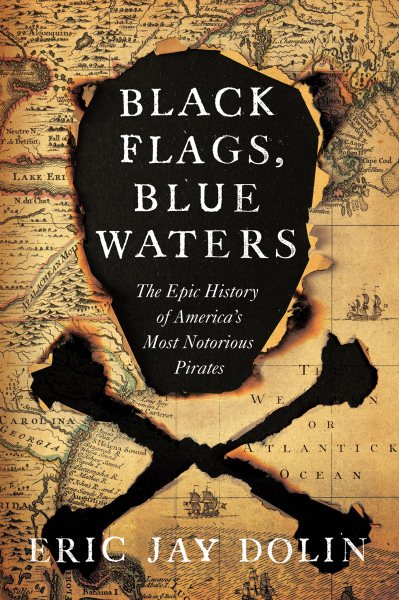By Jim Ewing. Special to the Clarion-Ledger Sunday print edition (October 7)
Eric Jay Dolin’s Black Flags, Blue Waters lives up to its subtitle as “The Epic History of America’s Most Notorious Pirates” with little known facts, sweeping narratives, and gripping tales.
 It’s a fascinating voyage into the Golden Age of Piracy that not only proves true some of the stereotypes of legend, book and film, but also debunks others and shockingly reveals the depth of early America’s connection to the outlaw seafarers.
It’s a fascinating voyage into the Golden Age of Piracy that not only proves true some of the stereotypes of legend, book and film, but also debunks others and shockingly reveals the depth of early America’s connection to the outlaw seafarers.
Indeed, the contributions of pirates to colonial America, Dolin reveals, was vital to the nation’s founding.
For example, he reports that by 1684, “at least half the coins in colonial America” were Spanish pieces of eight, most of them likely from pirates. The Boston mint, established in 1652, produced the colony’s coins from silver bullion provided by pirates. And the sea-dogs provided a substantial amount of indigo, cloth and sugar that provided New England’s essential needs—avoiding the high prices, inferior goods, and taxes of imports from the mother country.
Their plunder enriched the colonies, making niceties affordable to the masses. So much so that early colonists often sided with the pirates against the Crown’s wishes, laws, and regulations.
In this early period, pirates saw their occupation as a job, not a lifestyle, providing for their families and the wealth of their communities.
Of course, it didn’t hurt that the wealth was robbed from galleons loaded with gold and silver from the New World owned by English rival Spain, or was carried to Puritan New England from merchants robbed in the Muslim world.
Piracy in New England touched and infused all classes, both good and ill. The great-grandfather of President Millard Fillmore himself was a pirate (though conscripted against his will).
The organization of pirates at sea was also endemic of the American character, practicing that new idea of democracy 100 years before the colonies rebelled from monarchy. Crews on pirate ships signed contracts that stipulated their rights, obligations, and percentage of the booty each member received. And they could elect or remove a captain by voting—an unheard-of practice at sea.
This is not to say that pirates were upstanding citizens. Indeed, Dolin reports, they were usually thugs and ne’er-do-wells who differed only from their landlubber criminal contemporaries by robbing and debauching on water.
Even so, the picture formed by Dolin offers a view unlike that popularized in swashbuckling films and novels. For example, while pirates could be—and often were—cruel, barbaric and violent, they also preferred not to fight. The threat of violence was more to their liking, raising the Jolly Roger to extort riches rather than actually risking death.
It suited the preferences of the victims, as well. A sailor on a merchant ship working for low wages was not disposed to risk life and limb for investors or potentates far away. Better to heave to and give it up, to sail another day.
Dolin goes into great detail about the pirate colonies of the Caribbean and Bahamas (reportedly hosting some 4,000 pirates and dozens of ships at a time), as well as ventures along the American Eastern Seaboard, from the early 1680s to 1726. Then the tide turned from pirates aiding colonial economic interests to more frequently harming them with predations closer to home.
He offers extensive notes and bibliography for further reading.
Arghh, maties! Thar be treasure here.
Jim Ewing, a former writer and editor at the Clarion Ledger, is the author of seven books including his latest, Redefining Manhood: A Guide for Men and Those Who Love Them.
Eric Jay Dolin will be Lemuria tonight, Monday, October 8, at 5:00 to sign and read from Black Flags Blue Waters. Black Flags, Blue Waters is Lemuria’s September 2018 selection for our First Editions Club for Nonfiction.


Comments are closed.